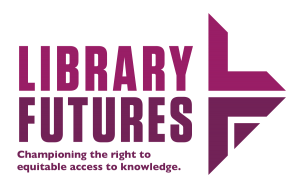Spurred in part by the challenges that libraries have faced while providing materials to the public during the global pandemic, the Library Futures Institute launched this week. As a nonprofit 501(c)(3) organization, Library Futures Institute is an advocacy organization formed to empower libraries to take control of their digital futures.
“The Board felt we needed a library organization that was focused like a laser beam on upholding and protecting a library’s right to loan works, including the use of digital and other technology to enhance access,” said Kyle K. Courtney, chair of Library Futures, and a copyright advisor and program manager at the Harvard Library Office for Scholarly Communication.
 The new nonprofit will advocate for less-restrictive licensing agreements for e-content, content ownership and stewardship, broad digital access for the public, and implementing the practice of Controlled Digital Lending (CDL) where patrons can borrow one secure digital copy of a book for every print book that a library owns.
The new nonprofit will advocate for less-restrictive licensing agreements for e-content, content ownership and stewardship, broad digital access for the public, and implementing the practice of Controlled Digital Lending (CDL) where patrons can borrow one secure digital copy of a book for every print book that a library owns.
“Libraries are trying to do what they’ve always done: lend books to people,” Courtney said. “Our patrons are in the digital space now, and need to go to where they are to fulfill our mission.”
SPARC is among initial coalition partners supporting Library Futures. Others include: Authors Alliance, Boston Public Library, Creative Commons, EveryLibrary, Internet Archive, Public Knowledge, Readers First and Special Libraries Association.
“The goal is to have an inclusive organization centered on library issues that includes other critical stakeholders who can be effective in communicating the important role that libraries play in society,” said SPARC Executive Director Heather Joseph, a board member of Library Futures along with Jill Hurst-Wahl, Meikle Hall, and Tucker Taylor.
Jennie Rose Halperin is executive director of the new organization. She comes to this position with a background as a digital strategist and librarian for Creative Commons and Harvard University Law School with a deep interest in community management and experience with web development and marketing.
“Equitable access to knowledge is my life’s work. It’s a fight we can and should win,” said Halperin. “This fight is crucial now as we see the long-term effects of scholarly information withheld from the public along with the monopolistic practices of the publishing industry that results in unfavorable for the public sector, but also for authors, readers, and creators.”
Library Futures is a coalition positioned to bring together advocacy and public interest groups with libraries, archives, the grant sector and cultural heritage sector to work on issues, Halperin said. The work will be a combination of awareness building, education, outreach, and advocacy.
“It’s imperative for libraries to stand up from a position of power and strength to assert the role of knowledge for the public good,” Halperin said.
More information is available on the Library Futures website. The public is invited to take action, follow the organization on Twitter and Instagram, and become a coalition partner.
Library Futures plans to host quarterly community conversations with supporters, you can sign up to the mailing list for more information. Its first event will be Feb. 10 and will focus on dispelling myths about Controlled Digital Lending in a panel discussion co-hosted by the Internet Archive. The webinar is free; click here for registration.